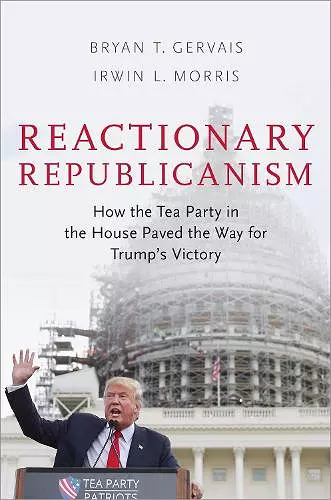Reactionary Republicanism
How the Tea Party in the House Paved the Way for Trumps Victory
Irwin L Morris author Bryan T Gervais author
Format:Hardback
Publisher:Oxford University Press Inc
Published:6th Sep '18
Currently unavailable, and unfortunately no date known when it will be back
This hardback is available in another edition too:
- Paperback£29.49(9780190870751)

The shocking election of President Trump spawned myriad analyses and post-mortems, but they consistently underestimate the crucial role of the Tea Party on the GOP and Republican House members specifically. In Reactionary Republicanism, Bryan T. Gervais and Irwin L. Morris develop the most sophisticated analysis to date for gauging the Tea Party's impact upon the U.S. House of Representatives. They employ multiple types of data to illustrate the multi-dimensional impact of the Tea Party movement on members of Congress. Contrary to conventional wisdom, they find that Republicans associated with the Tea Party movement were neither a small minority of the Republican conference nor intransigent backbenchers. Most importantly, the invigoration of racial hostility and social conservatism among Tea Party supporters fostered the growth of reactionary Republicanism. Tea Party legislators, in turn, endeavored to aggravate these feelings of resentment via digital home styles that incorporated uncivil and aversion-inducing rhetoric. Trump fed off of this during his run, and his symbiotic relationship with Tea Party regulars has guided-and seems destined to-the trajectory of his administration.
Bryan T. Gervais and Irwin L. Morris develop the most sophisticated analysis to date for gauging the Tea Party's impact upon the U.S. House of Representatives. They employ multiple types of data to illustrate the multi-dimensional impact of the Tea Party movement on members of Congress. * Wordtrade.com *
More importantly — at least for those of us interested in clues about the future direction of American politics — they suggest that there is still much to be gained from continued examination of the 2016 presidential election. Reactionary Republicanism is an important contribution to that effort. * Ruth Bloch Rubin, University of Chicago, Congress & the Presidency *
Much of the scholarly work on the Tea Party movement of the last decade concentrates on the motivations and beliefs of regular participants in the movement and the political forces that drove them to organize. Scholars singled out "resentment" as the primary factor in its creation and maintenance. This work relies on and assumes much of this scholarship but focuses on a neglected area, the institutional Tea Party, specifically Tea Party legislators in the House. Morris (Univ. of Maryland, College Park) and Gervais (UT San Antonio) question whether membership in the Tea Party caucus adequately captures all members in the movement because many who sought support from and/or attachment to Tea Party groups did not join the caucus. The authors were able to challenge some conventional wisdom... Recommended for scholars of American politics. * S. Wolfe, Louisiana State University *
ISBN: 9780190870744
Dimensions: 163mm x 239mm x 25mm
Weight: 596g
330 pages